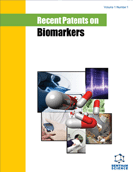Abstract
Lung cancer constitutes the leading cause of cancer death worldwide with an overall 5-year survival rate being only 11-14%. As advances in molecular biology reveal the genomic, proteomic and phenotypical heterogeneity of nonsmall- cell lung cancer (NSCLC), it has become evident that treatment strategies should be targeted and tailored to each patient's molecular tumor characteristics. An abundance of prognostic and predictive biomarkers of response to treatment has emerged, with epidermal-growth-factor-receptor tyrosine kinase mutations being the first established predictive biomarker in NSCLC. This review summarizes the relevant patents and most extensively investigated biomarkers in NSCLC over the past ten years and focuses on the recent discovery of several new biomarkers as well as on methodological approaches for the determination of prognosis and prediction of response to specific treatment strategies in NSCLC.
Keywords: Cancer biomarkers, molecular heterogeneity, non-small-cell lung cancer, proteomics, prognosis, targeted therapy, Predictive NSCLC Biomarkers, investigational biomarkers, RNA degradation, tumorigenesis
 4
4

